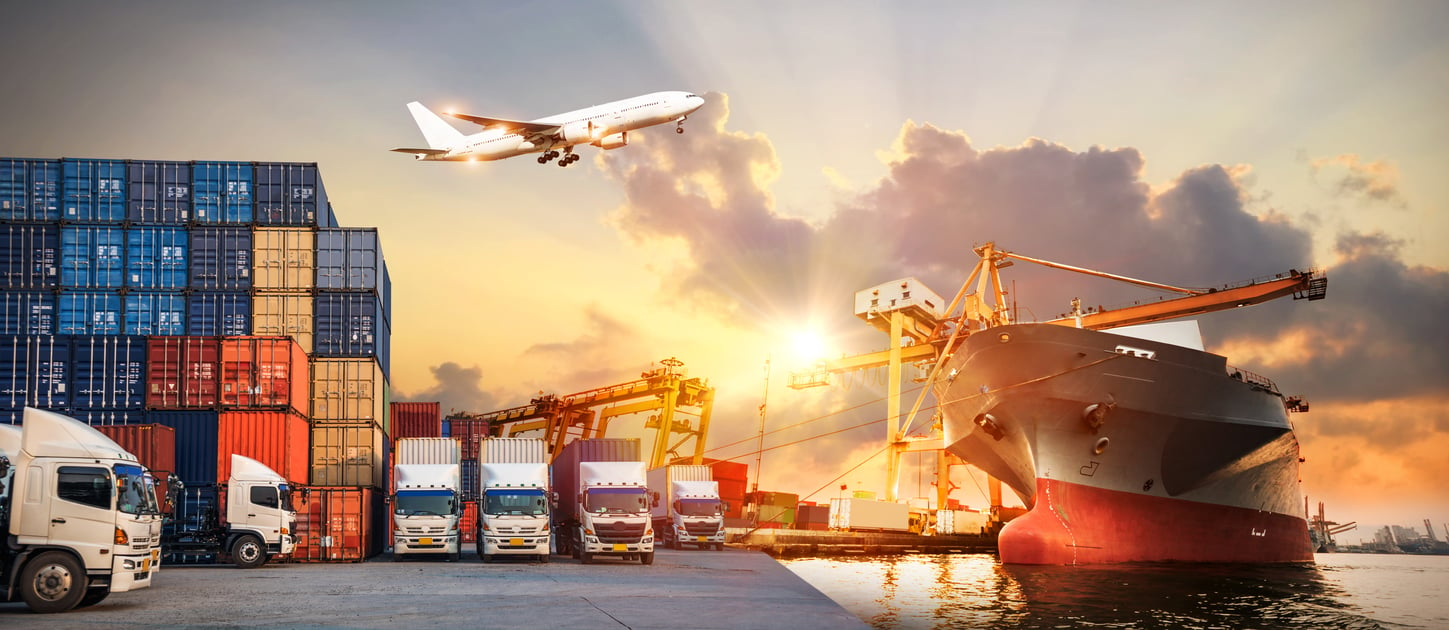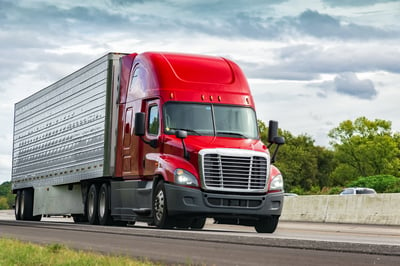
 Logistics professionals are constantly looking for a new mouse trap logistics solution that is better than sliced bread. We know this because over 20,000 viewers come to the InTek website every month looking for solutions to help them with their logistics and supply chain challenges.
Logistics professionals are constantly looking for a new mouse trap logistics solution that is better than sliced bread. We know this because over 20,000 viewers come to the InTek website every month looking for solutions to help them with their logistics and supply chain challenges.
As part of our conversations with visitors that decide to dig deeper into InTek’s logistics solutions is the question of InTek’s size, which we have found to be either an ice-breaker to start the conversation or more often size is thought to somehow impact the strength of a logistics solution.
Over the next several paragraphs we’ll walk through the pros and cons of mid-sized logistics companies versus the large logistics, but before doing so let’s start the conversation with a quote from Seth Godin … “A small to mid-sized business is not a big business that hasn’t grown up yet. It’s different. A small to mid-sized business has an owner, someone who can make decisions without meetings, who can listen to customers and who can embrace the work at hand.”
To continue the conversation of mid-sized logistics companies let's explore the concept of mid-sized versus large and you'll see there a numerous mid-sized LSP's just one or two customers away from being in Armstrong & Associates, Inc. yearly top 100 Domestic Freight Brokers / Freight Management Companies:
Armstrong & Associates Top 100 Domestic Transportation Managers / Freight Brokers
Ranked by 2019 Gross Revenue (US$ Millions)
 1. CH Robinson $11,283.7
1. CH Robinson $11,283.72 . XPO Logistics $3,895.0
10. Worldwide Express $1.794.1
20. Allen Lund $595.0
30. ArcBest $401.0
40. Priority1 $316.0
50. R2 Logistics $220.0
60. USAT Logistics $147.0
70. Buchanan Logistics $123.4
80. Dupre Logistics $101.4
90. ODW Logistics $82.0
100. Numerous $50.0 million mid-tier freight broker / freight management companies.
In other words, when talking the size of a logistics company it should really be thought of as mega, large, mid-sized and small niche freight companies with the following thoughts in mind:
- CH Robinson sitting at the top and being three times the size of the next competitor
- One of the other $1.0 billion plus companies that sit between the 2nd and 13th spot.
- Or sitting 50 or higher on the list.
- Any company listed at 51 or higher on the list is positioned to drop down quickly on the list if one of the many $50.0 million freight brokerage or freight management companies lands one or two sizable customers.
- After the above sits all the rest, which one needs to keep in mind there are roughly 17,000 freight brokerage companies, as listed by the Transportation Intermediaries Association.
With the above in mind, the topic of this article is the pros and cons of working with a mid-sized logistics company, which we’ll classify as one of those companies that sit around $50.0 to $100.0 million vs those that are larger in size.
Before jumping into the details of this article understand that while this blog is coming from InTek Freight & Logistics, the leadership and founders have a strong history operating several large logistics companies, along with being a shipper buying from logistics companies along the spectrum of large and small logistics companies. All in, this gives us a unique perspective to share pros and cons of evaluating the pros and cons of logistics companies.
Let's start the conversation with the pros of working with a mid-sized logistics company, then we’ll move into the cons.
Pros of Working with Mid-Sized Logistics Companies
-
Top management is engaged in your business.
 This is not to say that the large logistics companies are not, but it is different. As was said earlier a mid-sized business has an owner, someone who can make decisions without meetings, who can listen to customers and who can embrace the work at hand.
This is not to say that the large logistics companies are not, but it is different. As was said earlier a mid-sized business has an owner, someone who can make decisions without meetings, who can listen to customers and who can embrace the work at hand. - There is a deeper engagement and believe it or not, but the talent engaged in the business is at a higher level at the touch points of where a difference can be made.
- Top management, ownership and talent is engaged on the frontline with its business and customers.
-
Your business is a big fish in a medium sized pond with a mid-sized freight company.
- The result is your company matters every day and it will not get lost in the masses.
-
More nimble on requests and decision making.
- Decision making can be done within minutes, not days or weeks, as is often the case with the larger logistics companies.
-
More creative in designing a custom solution.
- The larger freight companies are great options for shippers that fit into their mold, but when it is asked to work outside their volume system glitches in performance and delivers a service that is consistently inconsistent.
- Unlike larger freight companies that operate on volume, the mid-sized freight company operates at customer levels and therefore can bring in more creative solutions that will succeed for the shipper.
-
Pricing is often lower on freight management and larger solutions.
- While on the surface this may sound like it would be more expensive, it often is not because the operating model does not require “X” volume to make it feasible.
- The mid-sized logistics companies operate a leaner organization in terms of management layers, but also general and administrative (G&A) and sales costs.
- The model is also built around the customer, not around volume and task.
-
Better understanding of where they add value.
 While both needs for volume sounds similar they are different. The mid-sized freight company is looking for extended relationships and will do all it can to add that type of long-term high value proposition because the cost of new customer acquisition is expensive.
While both needs for volume sounds similar they are different. The mid-sized freight company is looking for extended relationships and will do all it can to add that type of long-term high value proposition because the cost of new customer acquisition is expensive. - The mid-sized freight broker’s focus is deep, but narrow on what they do best and you will often hear them using the phrase “fit” because they know where they beat the larger logistics companies hands-down and they know when there is a business fit for them to be super successful long-term with a shipper.
- The mid-sized freight and logistics companies do not have a machine that requires the volume required for success, as a large freight company does. Instead, the mid-sized freight company has a sense of urgency to build volume based on extended value service to the customer.
-
More creativity can often be found within the well positioned mid-sized freight and logistics company.
- Mid-sized logistics companies have a resource pool that is often misunderstood by those working at the larger companies, but make no mistake that when you have found the "right" provider they will bring value and solutions that are often not matched by even the largest brokers.
Cons of Working with Mid-Sized Logistics Companies
With the pros behind us, let’s look into the cons of working with a mid-sized logistics company.
-
They lack the brand name.
- The lack of the mid-sized logistics company having a brand name can make it more of a challenge to get them approved as a freight provider. What we often say is people feel they won’t get fired if they choose a FedEx, JB Hunt, etc,, even if the solution doesn’t work because the thinking is if these companies help, then no one can.
- While the above thought may , the reality is there is quite a bit of hand holding from start to finish and from all levels within the mid-sized logistics companies to ensure success thta does not come from a larger logistics company.
- The lack of the mid-sized logistics company having a brand name can make it more of a challenge to get them approved as a freight provider. What we often say is people feel they won’t get fired if they choose a FedEx, JB Hunt, etc,, even if the solution doesn’t work because the thinking is if these companies help, then no one can.

-
Not all smaller logistics companies operate large.
While most mid-sized logistics companies are set-up as a large logistics company, there are some that play the "fake it until you make it" game. These companies give all the other mid-sized freight brokers a bad name and puts companies that work with them at financial and liability risk.
This one is by far the biggest problem where some mid-sized freight brokers and freight management companies fall under the fake it until they make it dance. Not only do these companies not have the professional management team or training to know all that needs to be done to be comparable to the largest companies, but they also put the groups they work with in financial and legal jeopardy. The following questions will help you find whether you are working with a well positioned freight provider:- Evaluate their banking relationship.
- Talk with the banking representation.
- Review line of credit (LOC) and how deep they are consistently into their LOC.
- Talk with their vendors and customers.
- Full system evaluation in terms of what platforms do they operate on and what are the contingency plans if there is a failure.
- Is their TMS on the Gartner Magic Quadrant?
- Ownership structure.
- Key person insurance coverage.
- Insurance on the ownership.
- Insurance on the business.
- Obtain a certificate of insurance for all their insurance coverages and know the deductibles.
- Find out if the insurance providers are known in the space with a high credit rating.
- Does the logistics provider have accounts receivable insurance, such as Euler Hermes or Atradius.
- Is the logistics service provider well known in the industry?
- Just because you or others in your company are not familiar with the mid-sized logistics company you are talking with does not mean the company is not well entrenched, known and held in high regard among their peers in the industry.
- Some things to look for is engagement on industry panels, board members, etc associated with Intermodal Association of North America (IANA), Transportation Intermediaries Association (TIA), Council of Supply Chain Management Professionals (CSCMP),EPA SmartWay Certified, etc.
- Also, does the group active on publishing strong industry content and if so do you find it engaging and enlightening or is it just marketing fluff?
- Some things to look for is engagement on industry panels, board members, etc associated with Intermodal Association of North America (IANA), Transportation Intermediaries Association (TIA), Council of Supply Chain Management Professionals (CSCMP),EPA SmartWay Certified, etc.
- Just because you or others in your company are not familiar with the mid-sized logistics company you are talking with does not mean the company is not well entrenched, known and held in high regard among their peers in the industry.
- Review the data consortiums and other business relationships the logistics provider is tied into for benchmarking and to keep thier pulse on the freight market.
- Here is an example where the mid-sized companies play large and punch above their weight. The proper engagements do not come cheap, but give them access to more data than even the latest of logistics companies, if those companies are not pulling data outside their own freight business.
- Understand how the logistics company connects into freight capacity and how do they ensure their freight is traveling on high quality carriers that are safe and fully insured.
- Evaluate their banking relationship.
-
 Be aware of your company’s size and scope of work against others the logistics provider serves.
Be aware of your company’s size and scope of work against others the logistics provider serves.- You do not want to be too large a fish in the medium sized pond because they may be biting off more than they can chew comfortably.
-
Pricing can be higher for spot freight business
- On the flip side, quite often what is saved on a spot rate is lost on the total cost of ownership and savings through a mid-sized freight management service solution versus that coming from a larger entity.
- There will be times the largest freight brokers will pull better rates on the spot market, but this is not a given.
-
Sales pitch is often not as polished with a mid-sized logistics company.
- With that said, plenty of deals are lost on this line alone and hinders the growth trajectory because “flash” does sell, but it does not deliver the solution.
- A sales pitch does not move freight, so this often is not a priority for the mid-sized broker. They would rather you talk with their customers, meet their team and show them what you can do for them.
Similar Characteristics of Mid-Sized and Large Logistics Companies
 Before closing we do want to add that there are similarities in mid-tier and large logistics companies.
Before closing we do want to add that there are similarities in mid-tier and large logistics companies.
- Logistics and supply chain companies do add value that companies typically cannot get on their own because of the complexity of the market, the technology advances and the relationships that drive the value.
- As we have shared in other articles, when working with a freight and logistics company, particularly when on a freight management relationship, the logistics service provider (LSP) is selling their tried and true business model they have been using to succeed for years.
- The small to medium sized shippers may feel that they cannot afford an outsourced solution for their company, but we’d argue they cannot afford not to engage one at a freight management service solution level. Executing at a micro level is not an effective way to drive a competitive advantage required in today’s logistics and supply chain market, as is described in the article entitled Freight Costs: An Insider’s Look on Freight Pricing Buyers Should Know.
- The key to success for shippers of all sizes is stop looking at freight as a cost center and all freight providers being a commodity that anyone can do if they have a price and a truck. Instead, shippers should look at your logistics and supply chain as a function that does drive a competitive advantage and then find the best freight and logistics company that fits their specific business requirements.
Final Thoughts on the Pros & Cons of Working with a Mid-Sized Logistics Company
So, we’ve just outlined the pros and cons of working with a mid-sized logistics company.
Given the challenging freight and logistics environment, partnering with an experienced 3PL provider will help turn an inefficient and costly supply chain into a competitive advantage, whether a large and mid-sized third party company. The key is finding the one that is the best for your business.
For the best results, structure your company's relationship with a 3PL around an outcome-based result from the start as opposed to treating it as a pure cost-reduction exercise.
Last, but not least we hope that this article helped in taking away any hesitation in working with a mid-sized 3PL.
Additional Resources on a Freight Management Service Solution:
- The Comprehensive Guide on Managed Transportation Services
- Best Managed Transportation Companies (And How to Choose)
- Top 20 Freight Brokerage Companies (& How to Choose The Best)
- The Complete Guide to Freight Management Service Solutions
- How Much Does Managed Transportation Cost? A Comprehensive Guide
- Freight Costs: An Insider’s Look on Freight Pricing Buyers Should Know
For more on InTek Freight and Logistics, please visit our website and blog.
Get Updates
Featured Articles
Categories
- Freight & Shipping Costs (54)
- Freight Broker (59)
- Freight Forwarder (2)
- Intermodal Transportation (183)
- International & Cross Border Logistics (43)
- Logistics & Supply Chain (418)
- Logistics Service Provider (76)
- LTL (39)
- Managed TMS (49)
- News (39)
- Supply Chain Sustainability (12)
- Transportation Management System (37)
- Truckload (122)
- Warehousing & Distribution (50)




